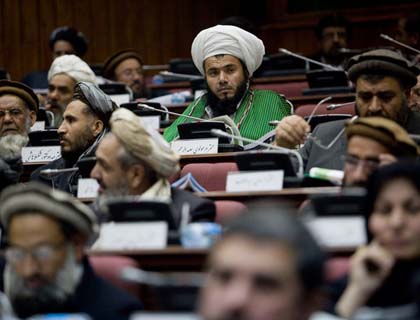KABUL – More than half of Afghanistan's lawmakers are boycotting parliament over an election authority's decision to replace nine MPs, a walkout that has pushed the legislature below quorum and extended a nearly year-long limbo.
The fraud-marred elections for parliament were held last September, but months of disputes between President Hamid Karzai and parliament over the results first delayed the opening of the 249-member assembly and then kept it barely functioning.
The uncertainty over the fate of the parliament is undermining an already weakened institution at a critical time, with violence at record levels and the withdrawal of foreign combat troops set to be complete by the end of 2014.
The latest dispute was sparked by the Independent Election Commission's (IEC) decision to unseat nine lawmakers, based on the findings of a special election court established by Karzai.
The members of parliament who have joined the boycott say they do not recognize the court, and see it as a tool for the president to meddle in the legislature's make-up.
They plan to stay away until they reach a deal to resolve the stand-off with the speaker of the house, or until the nine newly instated members relinquish their seats -- which they refuse to do, on the grounds they were the original winners.
"We will not attend the parliament until we reach an agreement with speaker of the house whether it takes days or weeks," said Asadullah Sadati, spokesman for the Support for the Law coalition, which is leading the boycott.
"We have proposed to the speaker that we could go to the parliament if the new nine MPs stop attending," he added.
Monday was the fifth day the parliament could not officially sit, because it was below the quorum of 125 to pass laws, although around 50 members of parliament who had not joined the boycott were scattered around in their seats.
A few hundred meters away, in a big tent set up in the grounds of a private house, opposition MPs have gathered to discuss tactics and bolster their resolve.
"When the law is broken and principles are not respected, there is no need to attend the parliament," Haji Abdul Zahir, the head of the "Support for the Law" group, told Reuters.
"The house of people must have independence -- they should not be represented by 'hand-picked MPs'," he said, accusing Karzai of meddling in the electoral process.
DEMONSTRATIONS
Even if a compromise can be reached over the status of the nine new members of parliament, it may not mean an end to the bitter disputes over who should be in parliament.
The special poll tribunal ruled that 62 lawmakers had won their seats through fraud and should be replaced, but the IEC only endorsed nine of the changes.
That decision to unseat only nine MPs satisfied neither the remaining 53, nor many of the sitting members of parliament, who although they were not affected by the changes, saw them as evidence of presidential meddling in parliamentary affairs.
Hundreds of supporters of the group of 53 are staging regular protests in the capital and provinces around Kabul, demanding that the IEC recognize all candidates endorsed by the court.
Under tight security, the nine new lawmakers have been regularly attending parliament, and say they won't back down.
"I am a legitimate member of parliament and there is no way I shouldn't attend," said Ahmad Khan Samangani, who was awarded a seat representing northern Samangan province. (Reuters)

